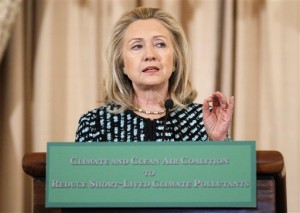US launches coalition to fight climate change

Secretary of State Hillary Rodham Clinton announces the Climate and Clean Air Coalition to Reduce Short-Lived Climate Pollutants initiative, Thursday, Feb. 16, 2012, at the State Department in Washington. AP PHOTO/CHARLES DHARAPAK
WASHINGTON—Faulting the world for not doing enough to curb climate change, the United States on Thursday announced the formation of a coalition to cut short-lived pollutants that speed up warming and harm health.
US Secretary of State Hillary Clinton said the coalition of the United States, Bangladesh, Canada, Mexico, Sweden and Ghana will launch a global drive to curb black carbon (soot), methane and hydrofluorocarbons (HFCs).
The chief US diplomat said such pollutants survive only a short time in the atmosphere – unlike long-lasting carbon dioxide, the main climate change culprit – but account for more than a third of global warming.
“We know that in the principal effort necessary to reduce the effects of carbon dioxide, the world has not yet done enough,” Clinton told an audience at the State Department that included envoys from the coalition countries.
“So when we discover effective and affordable ways to reduce global warming – not just a little, but by a lot – it is a call to action for all of us,” Clinton said.
Article continues after this advertisement“This coalition, the first international effort of its kind, will conduct a targeted, practical and highly energetic global campaign to spread solutions to the short-lived pollutants worldwide,” she added.
Article continues after this advertisement“It will mobilize resources, assemble political support, help countries develop and implement a national action plan, raise public awareness, and reach out to other countries, companies, NGOs and foundations.”
NGOs are non-governmental organizations that include environmental and other activist groups.
She said the UN Environment Program, which will serve as the coalition’s secretariat, has outlined 16 actions that can be taken to cut short-lived pollutants and slow global warming by 0.5 degrees Celsius by 2050.
The world’s goal is to limit the rise in temperatures to two degrees Celsius by that date, she and US officials said.
Clinton said the work of the coalition will “complement but not supplant” the main international efforts to fight climate change, which focus on cutting carbon dioxide emissions but also other so-called greenhouse gases.
Methane comes from landfills, coal mines, the oil and natural gas industry, agriculture and cows. Black carbon hails from cook stoves, kilns and diesel vehicles, while HFCs are used in aerosols, refrigerators and insulating foam.
Experts say such gases contribute disproportionately to climate change.
“They also destroy millions of tons of crops every year and wreak havoc on people’s health,” Clinton said.
Clinton announced an initial $15 million to launch the coalition – $12 million from the United States and $3 million from Canada.
A senior US administration official told reporters on condition of anonymity that other countries have already shown interest in the coalition, “and I fully anticipate that this small initial group of six will expand quickly.”
Elliot Diringer, executive vice president for the Center for Climate and Energy Solutions, based in Arlington, Virginia, told AFP that curbing carbon dioxide “must remain our primary focus, particularly over the long-term.”
But he said: “It will still be years before we see a comprehensive treaty and there is an enormous amount that can and should be done in the meantime, including action to reduce these short-lived forcers.”
Keya Chatterjee, director of International Climate Policy at World Wildlife Fund, accused Washington and Ottawa, which she said “have done very little to reduce” carbon dioxide emissions, of shifting the focus to poorer countries.
“Cutting black carbon emissions by ensuring adequate access to energy and cleaner cookstoves is in principle good, but we should not assume that this new initiative will deliver quick results,” she said in a statement.
“In short, while short-lived forcers provide a window of opportunity it should not distract us from addressing the biggest cause of climate change: CO2 (carbon dioxide) emissions,” Chatterjee said.